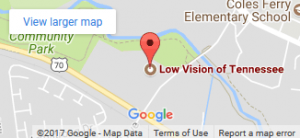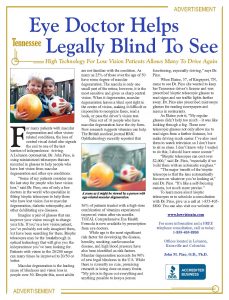Glaucoma is a progressive eye condition that can lead to low vision, making everyday tasks more challenging.
While there is no cure for macular degeneration as of yet, there are certain treatments that can slow its progression—as well as low vision aids that can improve the quality of life for a person living with imparied vision.
As cataracts worsen, they lead to a wide range of symptoms: from blurry vision and light sensitivity to halos around lights and colors appearing less vibrant. All can severely impact your ability to read, drive and enjoy hobbies — not to mention your quality of life.
Glaucoma, diabetic retinopathy, and cataracts are all eye diseases and the risk of developing these sight-threatening conditions increases if you have diabetes.
Use magnifying glasses, electronic devices with adjustable text size, and bright lighting to aid reading if you have macular degeneration.
If you love to cook but have low vision, working in the kitchen safely and independently can be challenging. At Low Vision of Tennessee in Nashville we offer our low vision patients practical advice and low vision aids and devices so they can keep doing the things they love.
If you or your loved one is struggling with low vision, please don't lose hope. Low vision technology helps people with severe vision loss maximize their vision so they can do the things they love. Read on to learn more about ways low vision aids, devices and glasses can help patients live more independent, full lives.
If you've been diagnosed with macular degeneration, glaucoma, or other sight-robbing eye diseases, don't lose hope. Low vision aids such as magnifiers, special glasses and devices can help those with vision loss lead an active life.
A recent scientific study suggests that it may be possible to slow down or even reverse the aging process. Read on to learn how this could impact the development of age-related macular degeneration (AMD), and how Low Vision of Tennessee can help.
Sunglasses are important for everyone, and especially for people with low vision. Here are several things to consider when purchasing a new pair of sunglasses.
Wet age-related macular degeneration (AMD) causes vision loss, but it can also cause visual hallucinations, the hallmark of Charles Bonnet syndrome (CBS). Learn about AMD-related visual hallucinations and how to manage them.
Having low vision can lead to frequent falls and other accidents. Here are 5 tips to make your home safer and easier to navigate.
For people with low vision, dating can sometimes feel daunting. Our eye doctors are here to offer tips to make dating easier and more comfortable for those with low vision.
Glaucoma is a serious eye condition that can lead to irreversible vision loss and even blindness. The sooner glaucoma is detected and treated, the better the outcome. Regular comprehensive eye exams are the only way to catch glaucoma early, when it can still be managed.
Low vision patients can greatly benefit from having a support person in the exam room with them, as he or she can provide emotional support and guidance during and after visits to the eye doctor.
People with age-related macular degeneration (AMD) gradually experience vision loss that makes reading a challenging task. Fortunately, various strategies and vision aids can help those with AMD see more clearly and read more comfortably.
Low vision patients have a good reason to be upset. Dr. Richard Shuldiner, the founder of the International Academy of Low Vision Optometrists, explains why in an article he published in the Optometric Management Magazine.
Different types of low vision glasses and devices enable macular degeneration patients to cope with vision loss. Telescopic lenses enable you to recognize faces, whereas microscopic lenses or prismatic reading glasses help you read or write.
Many people who live with Best disease —a form of juvenile macular degeneration — can still drive and keep their driver's license. Low vision aids, such as bioptic telescope glasses provided by a low vision optometrist, are one possible solution.
Are you frustrated that your poor vision is it getting in the way of life? Is it hard to do simple things, such as seeing your adorable grandchildren's faces?




